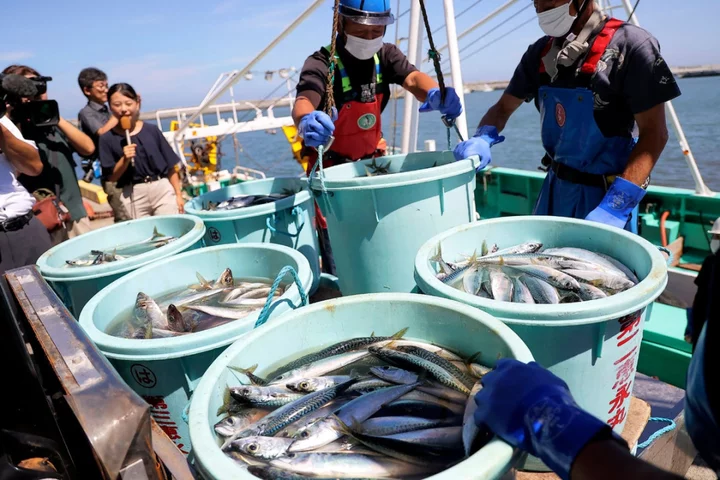Russia has joined its ally China in suspending seafood trade with Japan after Tokyo began releasing treated radioactive water from its Fukushima nuclear plant into the ocean.
Russia’s agricultural watchdog Rosselkhoznadzor said it is "joining China’s provisional restrictive measures on the import of fish and seafood products from Japan as of 16 October 2023”.
It said the decision has been taken as a "precautionary measure” and restrictions will remain in place until more information was received to confirm the safety of Japanese seafood, which it said was still pending.
Japan said the ban was “unjust” and regrettable.
Japan began releasing the first batch of treated radioactive water from the tsunami-wrecked Fukushima nuclear power plant into the Pacific Ocean on 24 August and the second on 5 October amid opposition from fishing groups and neighbouring countries, including major trade partners like South Korea, China and Taiwan.
The release of tons of water has generated international concerns with countries expressing doubts about the potential health and environmental risks posed by the release, leading to diplomatic and trade tensions with neighbours.
This is despite Japan’s assurances that the released water is safe and will be diluted to well below internationally approved levels of tritium (an isotope of hydrogen hard to separate from water) before being released into the Pacific.
Analysts have said that the restrictions on the import of fish from Japan appear unreasonable and could be motivated by political and financial interests rather than safety fears.
Mark Foreman, an associate professor of nuclear chemistry in Sweden, told The Independent that the levels of radioactivity in the water discharged from the Fukushima site will not pose any danger to the general public and that these bans could not be defended from a scientific viewpoint.
“I do not think it will even endanger a fish glutton who eats nothing but fish,” he said. “There is the problem that many politicians and countries wish to be seen to be more strict or protective of the public than another.”
Reacting to Russia’s restrictions, Japan‘s Ministry of Agriculture, Forestry and Fisheries said on Monday that Moscow’s ban had "no scientific basis, is unjust and regrettable”, calling for it to be revoked, the Kyodo news agency reported.
Japan‘s foreign ministry said that it had provided Russia with additional information before 15 October following an online dialogue between the relevant state bodies last week, it said in a statement released on Monday before Russia announced its ban.
"Japan will continue to provide explanations based on scientific evidence to Russia in a highly transparent manner and in good faith, while undergoing the review by the IAEA," it added.
Russia’s move comes after China – Japan’s biggest buyer of seafood – implemented its own ban on all seafood imports from Japan.
Tokyo called on China and its territories Hong Kong and Macau to remove the ban and prime minister Fumio Kishida criticised Beijing for spreading "scientifically unfounded claims".
Mr Foreman and other analysts suggested the bans could be explained partly by Tokyo’s closer alignment to the US and South Korea in recent years and the Fumio Kishida government’s policy of speaking out against the Ukraine war.
“I see the bans as being made for political advantage and also in an attempt to obtain an economic advantage for the fishing fleets of the countries which are imposing the bans. I believe that no good scientific arguments can be made for these bans,” Mr Foreman said.
International trade law expert Henry Gao told BBC News: “The main reason is not really the safety concerns. It is mainly due to Japan’s moves against China.”
Vladimir Putin is due to visit Beijing this week for the Belt and Road Initiative Forum, only his second foreign visit since an International Criminal Court (ICC) arrest warrant was issued against him.
Russia and China have forged closer ties and hailed their “no limits” partnership as Western countries have tried to isolate Mr Putin following his invasion of Ukraine.
Moscow had criticised Tokyo for its stance on the war and for joining the Group of Seven (G7) nations in imposing sanctions after the invasion in February last year.
Russia is also a direct competitor with Japan when it comes to catching fish and seafood in the waters off its far eastern regions, and is already one of the largest suppliers of marine products to China.
Not a big market for Japanese seafood itself, Russia imported 118 metric tonnes of fish and seafood from January to September this year, according to Rosselkhoznadzor.
Beyond China and Russia, the South Korean government is under pressure to put a blanket ban on imports from Tokyo. Seoul has maintained an import ban on fisheries products from Fukushima and some surrounding prefectures since 2013 but has so far refused to extend this to the rest of Japan.
Read MoreJapan starts discharge of second treated batch of Fukushima water
US ambassador to Japan calls Chinese ban on Japanese seafood 'economic coercion'
Japan hits out at China’s ‘unacceptable’ seafood ban as it rolls out emergency fund
The Body in the Woods | An Independent TV Original Documentary
The harrowing discovery at centre of The Independent’s new documentary

